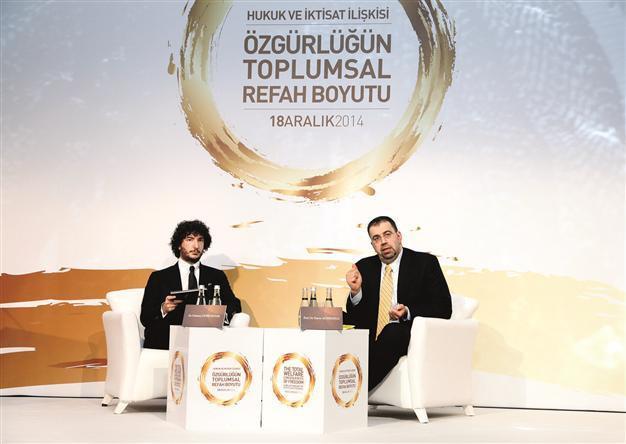Turkish institutions always part of ‘sultan’s state,’ says top economist
ISTANBUL - Reuters

MIT economist Daron Acemoğlu (R) speaks during the “Relationship between Law and Economy: The Public Welfare Dimension of Liberties” panel, organized by Transparency International Turkey and the Consulate General of Sweden in Turkey.
Turkey’s economic and political institutions have always been part of a “sultan’s state” and this can only be overcome by public demands from below for more human rights, freedom and transparency, according to leading economist Daron Acemoğlu.“There a mixture of inclusive and extractive institutions in Turkey. Turkey’s economic and political institutions have always been characterized by a ‘sultan state.’ This can only be overcome by more political participation of the masses and a rise in public demands for more human rights, freedom and transparency,” MIT Professor Acemoğlu said on Dec. 18, speaking at an Istanbul panel titled “The Relationship between Law and Economy: The Public Welfare Dimension of Liberties,” organized by Transparency International Turkey and the Consulate General of Sweden in Turkey.
Acemoğlu, who examined the connection between economic development and democratic rule in a celebrated book “Why Nations Fail,” co-authored with James Robinson, stressed at the panel that democracy and pluralism have a positive impact on economic growth.
“It is not a coincidence for us to see that richer countries are also more democratic ones,” he added.
Applying the arguments from his book, he noted that nations sometimes develop inclusive institutions, which are more characterized by democratic values, plural democracy and fundamental rights and liberties. In other places, those institutions become “extractive” and concentrate power and opportunity in the hands of only a few.
Speaking at the same panel, lawyer and academic Gönenç Gürkaynak emphasized the importance of the policies of law based on individual liberties in maintaining the balance between economic growth and income equality.
“The first step of the extension of the sphere of rights is to preserve freedom of expression.... In this vein, innovation, the main basis of economic growth, is possible so long as freedom of expression exists,” Gürkaynak said.
















